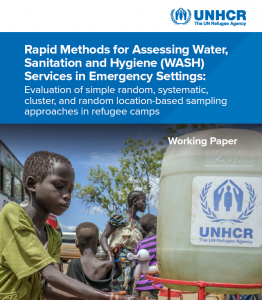
Publisher: UNHCR Year: 2017 Description: This document evaluates various sampling strategies that can be used during the emergency phase to estimate the status of WASH services in refugee camps or settlements. The working paper presents the results of statistical analyses carried out on real data from Ethiopia. The objective of the study was to evaluate […]
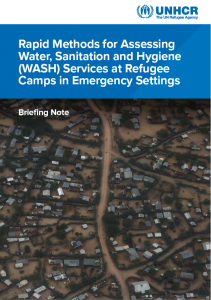
This document describes UNHCR’s methodology for conducting rapid WASH household assessments in refugee settings.
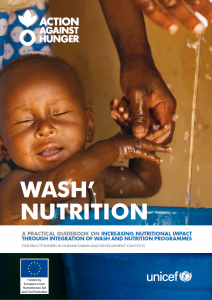
A practical guidebook on increasing nutritional impact through integration of WASH and Nutrition programmes. It is meant for practitioners in humanitarian and development contexts.
Tags: Capacity Building, Child Friendly Facilities, Cross Cutting, Excreta Management, Human Right to Water / Sanitation, Hygiene Promotion, Protection, Solid Waste Management, WASH Assessments, WASH Coordination, WASH Monitoring, WASH Programme Health and Safety, WASH Strategy Development, and Water Supply. Locations: Africa, Asia and the Pacific, Central Asia, Europe, Middle East, and South-West Asia. Languages: English. Organisations: ACF and UNICEF. Categories: WASH Policy Guidelines and WASH Reference Documents.
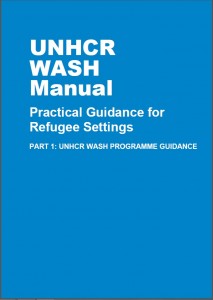
The UNHCR WASH Manual Part 1: Programme Guidance, provides practical guidance for WASH programmes in refugee settings.
Tags: Camp Closure, camp management, Capacity Building, CASH Interventions, Child Friendly Facilities, Cold Climates, Cross Cutting, Disability, Environment, Gender, Gender Based Violence, Human Right to Water / Sanitation, Protection, Value for Money, WASH Assessments, WASH Coordination, WASH Monitoring, WASH Programme Health and Safety, WASH Programme Management, WASH Reporting, and WASH Strategy Development. Languages: English. Organisations: UNHCR. Categories: WASH Manual, WASH Operational Guidelines, WASH Policy Guidelines, and WASH Reference Documents.
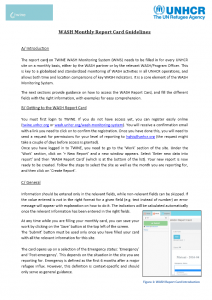
This document provides guidance on how to access the WASH Report Card within TWINE, and fill in the different fields with the right information, with examples for easy comprehension.
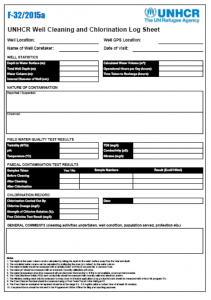
This is the standard UNHCR well cleaning and chlorination template for refugee settings available in PDF and MSExcel formats. The form should be completed each time a hand dug well is cleaned, chlorinated and tested for faecal coliforms. The form is available in MSExcel format so WASH actors can adapt the content to the context.
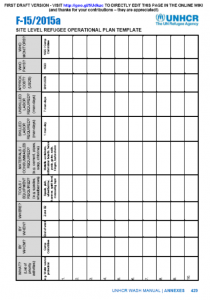
This template can be used to help UNHCR and WASH actors establish a simple WASH operational plan (WHO will do WHAT, WHERE, WHEN, and HOW and WHO will PAY and WHO will MONITOR). This template can be used in addition to the site level WASH Strategy Template.
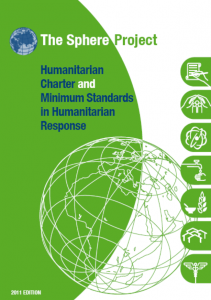
The Sphere Handbook is one of the most widely known and internationally recognized sets of common principles and universal minimum standards for the delivery of quality humanitarian response.
Tags: Bathing Facilities, Capacity Building, Communal Toilets, Cross Cutting, Disability, Disease Vector Control, Drainage, Environment, Excreta Management, Gender, Gender Based Violence, Grey Water Disposal, Handwashing with Soap, Household Water Treatment, Human Right to Water / Sanitation, Hygiene Promotion, Laundering Facilities, Menstruation Hygiene Management, Piped Water Networks, Protection, Public Health, Solid Waste Management, WASH Assessments, WASH Coordination, WASH Monitoring, WASH Programme Management, Water Quality Testing and Surveillance, Water Safety Plans, and Water Supply. Languages: English. Organisations: SPHERE. Categories: WASH Reference Documents.
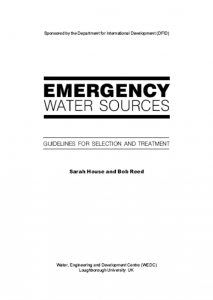
These guidelines have been designed to help those involved in the assessment of emergency water sources to collect relevant information in a systematic way, to use this information to select a source or sources and to determine the appropriate level of treatment required to make the water suitable for drinking.
Tags: Boreholes, Bulk Water Treatment, Drilling, Groundwater, Hand Dug Wells, Handpumps, Household Water Treatment, Piped Water Networks, Rainwater Harvesting, Solar Pumping, Spring Protection, WASH Assessments, WASH Monitoring, WASH Programme Management, Water Prospection and Investigation, Water Pumping, Water Quality Testing and Surveillance, Water Safety Plans, Water Storage, Water Supply, and Water Tankering. Languages: English. Organisations: WEDC. Categories: WASH Emergency Guidelines and WASH Reference Documents.
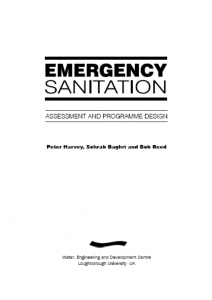
The book Emergency Sanitation: Assessment and programme design has been produced to assist those involved in planning and implementing emergency sanitation programmes. The main focus of the book is a systematic and structured approach to assessment and programme design. It provides a balance between the hardware (technical) and software (socio-cultural, institutional) aspects of sanitation programmes, and links short-term emergency response to long-term sustainability. The book is relevant to a wide range of emergency situations, including both natural and conflict-induced disasters, and open and closed settings. It is suitable for field technicians, engineers and hygiene promoters, as well as staff at agency headquarters.
Tags: Communal Toilets, Desludging and Excreta Transportation, Excreta / Urine ReUse, Excreta Composting, Excreta Management, Excreta Treatment, Household Toilets, Sewerage and Excreta Conveyance, WASH Assessments, WASH Monitoring, and WASH Programme Management. Languages: English. Organisations: WEDC. Categories: WASH Emergency Guidelines and WASH Reference Documents.
 English
English










